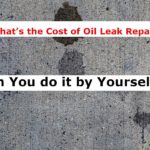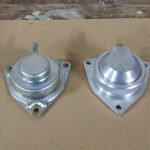7 Probable Reasons of Slow Car Acceleration [+Solution]
Is your car accelerating slower than usual? Is it stuck between a speed bracket of 35-60 mph? Then this article is for you. Diminished car acceleration can be due to several problems.
Let’s find out about those issues. How to resolve them? And how much they can cost you?
Why is Your Car Accelerating Slow?
There are several reasons for slow acceleration but if you dig deep, it’ll all come down to one single problem- bad or incomplete combustion.
Slow car acceleration can be due to many reasons. But before we discuss its details, you must understand the core reason for sluggish acceleration.
As you must already know that power in an ICE is produced as a result of combustion. For combustion to occur, air and fuel are mixed. Then this mixture enters the combustion cylinder. Four basic processes occur here:
1. Intake of the air-fuel mixture
2. Compression of the mixture (up to the point of ignition)
3. Expansion of gases (Due to heat released in the combustion process)
4. Exhaust of Gases
This cycle goes on and on and as a result of each circle, we get one stroke of power.
A faulty sensor, dirty oil filter, clogged air filter, failed catalytic converter everything leads to compromised combustion. As a result, we get reduced power and slow acceleration.
Now, let’s take a look at the reasons for slow car acceleration in detail.
Also read: 20 Best Cars in Europe (Almost Failure-Free)
1. Unfavorable Environment
Climate zones with low oxygen levels can also cause the slow acceleration of your car. As oxygen is the main constituent of the air-fuel mixture entering the combustion chamber. Hilly and mountainy areas have low air pressure, hence a lower level of oxygen present in it.
If correct amounts of oxygen are not present in the air, then the combustion process does not deliver full power. To put it simply 1 gram of octane needs 12.5 grams of oxygen for complete burning. If oxygen levels are low, incomplete combustion occurs. This can result in the slow acceleration of your car.
Solution: You can try your luck with the modified settings of the O2 emission sensor. It will lead to lesser oxygen being discharged. As a result, more oxygen will be available for combustion.
Cost of Fixing: This is the job of an ECU expert, who can charge between $150-250.
Read it: 5 Costly Reasons to not Run a Car on Low Fuel
2. Clogged Air Filter & Exhaust
Uninterrupted air supply to an engine is compulsory. Hindrance in air supply is a probable cause for the slow acceleration of your car.
Air filters are used in the engine to avoid dust particles from entering it. Such dirty air filter needs changing or cleaning after 2,000-3,000 miles. A dirty air filter can choke the car and prevent it from crossing a certain speed limit.
The airflow meter actuates the amount of air entering the mixing chamber. It then sends this data to the engine control unit. Which decides the ratio of AF mixture. The malfunctioning of the airflow meter can also cause the vehicle to choke.
Clogged Exhaust is also a potential reason for the slow acceleration of cars. For the same reasons as a dirty air filter. Dust, debris, and exhaust particles can obstruct the path of gases, causing the vehicle to accelerate at lower rates.
Solution: Keep your car clean at all times. Tuning after 10,000 miles is a must. The earlier the better.
Cost of Fixing: The cost of replacing a dirty air filter can vary between $20-30.
Trending Video: How to Easily Bring Back to Life any Old Car Battery and Save Tons of Money (click to watch)
3. Fuel Delivery Issues
An adequate supply of fuel is as critical as a good flow of air. Because the correct ratio of the air-fuel mixture is primarily responsible for power generation.
Fuel Filter serves the same purpose for fuel as air filter serves for air. Any unwanted particles in fuel are filtered by it. Blockage of fuel filter or strainer can hinder the ability of the engine to receive proper amounts of fuel.
Although many cars have moved to alternative techniques for fuel injection. But still, a clean fuel injection valve is inevitable for proper fuel supply. Carbon scales can form on these valves. This causes untimely closing and opening of the valve. As a result, users sometimes experience slow car acceleration.
A fuel pump is responsible for the transport of fuel to the mixing chamber. If this pump is not functioning correctly then fuel supply can be affected. The reduced amounts of fuel reaching the combustion chamber can cause lower power output during each stroke of the engine.
A bad tank of gas is also responsible for slow car acceleration. Sometimes this can happen due to sheer negligence of gas suppliers, where they blended additives in wrong proportions, and sometimes due to contaminants present in your gallon of fuel. However, the result in both scenarios is choking of car.
Solution: Make sure that the quality of fuel is up to the mark. Get changed dirty oil filter at the earliest.
Cost of Fixing: A faulty fuel pump can be repaired, which may cost $50-100. However, the cost of replacing a dirty fuel filter can be between $10-20.
Also read: Are Cars Made in China? Which Ones?
4. Bad Spark Plugs and Ignition Coils
In petrol engines, after compression, a spark plug is used to ignite high-temperature gases. If the plug is unable to produce a spark, we’ll have reduced or no power at all. Hence, we must always check for a faulty spark plug if the car is lagging. A bad ignition coil can be another cause for the slow acceleration of the car.
Most of the cars don’t have a turbocharger. It is installed to lower the temperature of gases entering the combustion chamber. The lower temperature of incoming gases yields higher power output. If the amount of gas leaving the turbocharger is more than required, it might cause misfiring during combustion.
Solution: Spark plugs need to be inspected regularly. An extremely wet, dry, or oily plug should not be ignored. After 20,000 miles it is highly recommended to replace them.
Cost of Fixing: The replacement of a set of the spark plug can cost around $20-110. Depending upon the make of your car.
Read it: Top 5 Countries that Make the Most Reliable Cars
5. Emission Control Malfunction
High-end technology is employed in vehicles to control the emission of harmful particles. The latest technologies tend towards being unreliable.
The function of the O2 emission sensor is to keep the composition of exhaust gases under check. It does so by measuring the amount of O2 in the exhaust. If levels are higher or lower than normal it sends an error report to ECU. This may lead to slow acceleration.
The smell of Sulphur and unburnt fuel from the catalytic converter is a big red flag. A failed catalytic converter can start a fire and burn down your entire car. However, a minor symptom of fault in the catalytic converter is slow acceleration.
An exhaust gas recirculation valve is used to reduce NOX emissions. It reverts some of the exhaust gases to combustion cylinders. This valve is electronically controlled. Mistiming in the opening of its flaps can cause out-of-order firing in cylinders. Leading to limited power generation and slow accelerated cars.
Solution: Solving the emission control issue can be a bit tricky. Every mechanic cannot resolve it. Cleaning the catalytic converter is an option. But emission sensors often need changing.
Cost of Fixing: Emission-related issues are costly to repair. It may come around to $150-500.
6. Engine Related Issues & Worn Out Hardware
Sufficient compression of gases during combustion is necessary to maintain specific power levels. Leaked vacuum hoses and worn-out piston rings undermine the ability of the engine to fully compress the gases. Insufficient compression can lead to incomplete combustion.
Case with diesel engines is more critical. They have higher compression ratios. Gases are compressed to the extent of self-ignition. In the absence of a spark plug, the entire combustion process is dependent upon the building of high pressure. And if due to any of the above reasons that pressure is not achieved, it can result in low power output.
The clutch has a function to engage the transmission and engine output shaft. A slipping clutch adversely affects the average output of the engine. This has nothing to do with what’s happening inside it. Even if the engine is producing optimum power, still it’ll go to waste. Because the transmission is unable to use it due to slipping of the clutch.
The same is the case with a timing belt. A worn-out timing belt is a key issue behind the slow acceleration of a car. It is a very critical component of an engine. Even if it lags or leads by a degree, your car can face some pretty serious acceleration issues.
Solution: Worn-out rings, belts, and clutch plates require immediate changing.
Cost of Fixing: Changing the clutch plate or timing belt is easy. Its cost will be between $50-100. But changing worn-out rings is costly as the whole engine has to be opened. It may cost around $200-300.
Also read: 20 Cars that Use AdBlue
7. Sensor Malfunctioning
There is a long list of sensors that bring about the proper functioning of a vehicle. Let’s take a look at each of their function:
TPS Sensor: A TPS sensor actuates the speed of vehicle according to the pedal accelerator commands given by the driver.
Crankshaft Sensor: Crankshaft position sensor sends data to ECU. This data is used by ECU to decide the firing sequence, opening & closing of inlet & outlet valves.
MAP Sensor: The Manifold Absolute Pressure sensor shortly known as MAP sends data about the load on engine to the electronic control unit (ECU).
EFI Sensor: Electronic fuel injector is responsible for the injection of fuel into combustion cylinders. It adjusts the amount of fuel to maximize efficiency.
Coolant Temperature Sensor: It sends the report of engine coolant temperature to ECU, which then decides the amount of oxygen to be supplied for starting. Since cold engines require extra oxygen.
If any of these sensors aren’t working properly, it may result in an error signal sent to ECU. This will in turn put your car in limp mode.
Solution: As discussed above faulty sensors mostly need changing. That’s the only way to fix their malfunctioning.
Cost of Fixing: Depending upon the sensor, the cost of changing it may vary between $250-600.
To summarize it all, please take a look at table below.
| Problem | Solution | Cost |
| Clogged Air Filter | Replacement | $20-30 |
| Faulty Airflow Meter | Replacement | $200-300 |
| Clogged Muffler | Cleaning | $50-80 |
| Clogged Fuel Filter | Replacement | $10-20 |
| Defective Fuel Pump | Repair | $50-100 |
| Bad Spark Plug | Replacement | $20-100 |
| Bad Ignition Coil | Replacement | $40-200 |
| Faulty Catalytic Converter | Cleaning | $150-500 |
| Faulty EGR Valve | Cleaning | $20-60 |
| Leaked Vacuum Hose | Replacement | $35-105 |
| Worn Out Piston Seals | Replacement | $200-300 |
| Worn Out Timing Belt | Replacement | $50-100 |
| Sensor Malfunctioning | Replacement | $250-600 |
| Worn Out Clutch Plate | Replacement | $50-100 |
Don’t Ignore Limp Mode
Most modern cars are electronically controlled. If any fault is detected, an error signal is generated. This may put the car in Limp Mode. It is indicated by an engine light on display. If your car goes into Limp mode, it will automatically reduce its ability to accelerate. As an effort to prevent your car from further breakdown.
The limp mode shouldn’t be ignored. Corrective measures should be taken immediately.
How Long Can You Drive with Slow Acceleration?
Slow acceleration isn’t a big issue itself, but it is a symptom that something bigger is going to happen and you should act immediately. As most of the reasons for slow acceleration are directly linked to problems in the engine or its core parts.
Hence it shouldn’t be treated lightly. If your car isn’t accelerating normally, you should take immediate notice. Pay an urgent visit to the workshop and get the issue resolved. As small faults can project into a larger issue that can cost way more money and time.
References
aamcominnesota.com, familyhandyman.com, sunautoservice.com, cartreatments.com, oards.com, zutobi.com, rustyautos.com, stroebelautomotive.com






